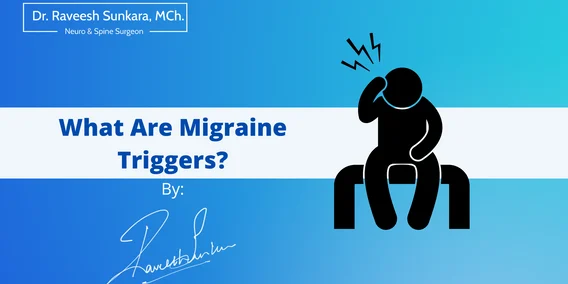Migraines are a debilitating and often chronic neurological condition affecting millions worldwide. These intense headaches can last from a few hours to several days. This condition significantly impacts a person’s quality of life.
While the exact cause of migraines is still not fully understood, researchers have identified specific triggers that can initiate or worsen an episode.
Recognizing these triggers and implementing appropriate treatment strategies can help individuals manage their migraines more effectively.
Migraine triggers are external factors or internal conditions that can activate the processes leading to a migraine attack. It is important to note that triggers can vary from person to person, and what triggers a migraine in one individual may not have the same effect on another.
Identifying personal triggers is crucial for effective migraine management and prevention.
When seeking expert medical advice on migraines, Dr Raveesh Sunkara, a highly regarded neurosurgeon in Hyderabad, stands out as a specialist in the field of neurosurgery.
With extensive knowledge and experience, Dr Sunkara has helped many patients manage and overcome the challenges associated with migraines. His expertise in understanding the triggers and treatment options makes him a valuable resource for those seeking relief from this debilitating condition.
This blog explores common migraine triggers and their potential impact on individuals prone to migraines.
Common Migraine Triggers
Migraine triggers can vary significantly from person to person. However, some commonly reported triggers are worth considering:

Lifestyle factors
- Sleep disturbances: Irregular sleep patterns, insufficient sleep, or changes in sleep routine can trigger migraines.
- Stress: Emotional stress, including anxiety, tension, or excitement, is a well-known migraine trigger.
- Physical exertion: Intense physical activity, excessive exercise, or sudden exertion can trigger migraines in some individuals.
- Changes in routine: Any significant changes in daily routine or disruptions to regular activities can provoke migraines.
Environmental factors

- Bright lights and flickering screens: Exposure to bright lights, fluorescent lighting, or prolonged screen time can trigger migraines in susceptible individuals.
- Strong odours: Perfumes, chemicals, cleaning products, and strong smells can trigger migraines.
- Weather changes: Drastic changes in weather, such as sudden temperature fluctuations, high humidity, or changes in barometric pressure, can provoke migraines.
Dietary Factors
- Caffeine and alcohol: Consuming excessive amounts of caffeine or alcohol, or sudden withdrawal from these substances, can trigger migraines.
- Food additives: Certain food additives, such as monosodium glutamate (MSG) or artificial sweeteners, have been associated with migraines in some individuals.
- Dehydration: Not drinking enough water or becoming dehydrated can act as a trigger for migraines.
Hormonal factors
- Menstruation: Many women experience migraines related to hormonal fluctuations during their menstrual cycle.
- Hormone replacement therapy: Some women may develop migraines while using hormone replacement therapy.
Sensory stimuli
- Strong smells: Perfumes, cigarette smoke, and other strong odours can trigger migraines in sensitive individuals.
- Loud noises: Exposure to loud or sudden sounds or noises can provoke migraines.
- Specific visual patterns: Flickering lights, repetitive patterns, or bright, flashing lights can trigger migraines in some individuals.
Medications
Certain medications can trigger migraines as a side effect.
- This can include hormonal contraceptives, blood pressure medications, and vasodilators.
- The patient must discuss potential side effects with their healthcare provider when starting a new medication.
“It is crucial to note that not all migraines are triggered by external factors. Some migraines can occur spontaneously without a specific trigger, while a combination of factors may influence others, explains Dr Raveesh Sunkara, a highly qualified neurosurgeon doctor in Hyderabad.”
“Working closely with a healthcare provider to identify triggers and develop an individualized management plan is essential.”
Migraine Treatment and Management
Treatment for migraines involves a two-pronged approach: avoiding triggers and managing symptoms.
“Identifying personal triggers can be challenging. But keeping a migraine diary to track potential triggers and symptom patterns can be helpful. Once patients identify the triggers, they can modify their lifestyle to minimize exposure, says Dr Raveesh Sunkara.”
For example, ensuring a regular sleep routine, managing stress through relaxation techniques, and avoiding excessive physical exertion can help reduce the likelihood of migraines.
Migraine management can involve various medical interventions. Mild to moderate migraines can often be effectively addressed with OTC pain relievers, like ibuprofen or acetaminophen, providing relief.
In cases of more intense migraines, prescription medications such as triptans are available to alleviate symptoms and shorten the duration of an episode.
In addition to medication, doctors recommend preventive therapies for individuals experiencing frequent or severe migraines. These may include beta-blockers, antidepressants, antiepileptic drugs, or Botox injections.
Doctors may prescribe hormonal treatments, such as birth control pills, to women with menstrual-related migraines.
Conclusion
Identifying and avoiding migraine triggers can significantly improve the quality of life for individuals prone to migraines. While the triggers mentioned above are common, it is essential to remember that everyone’s triggers may differ.
By consulting specialists like Dr Raveesh Sunkara, the patient can gain valuable insights about migraines and develop a tailored approach to prevention and management, leading to a better and healthier life.







